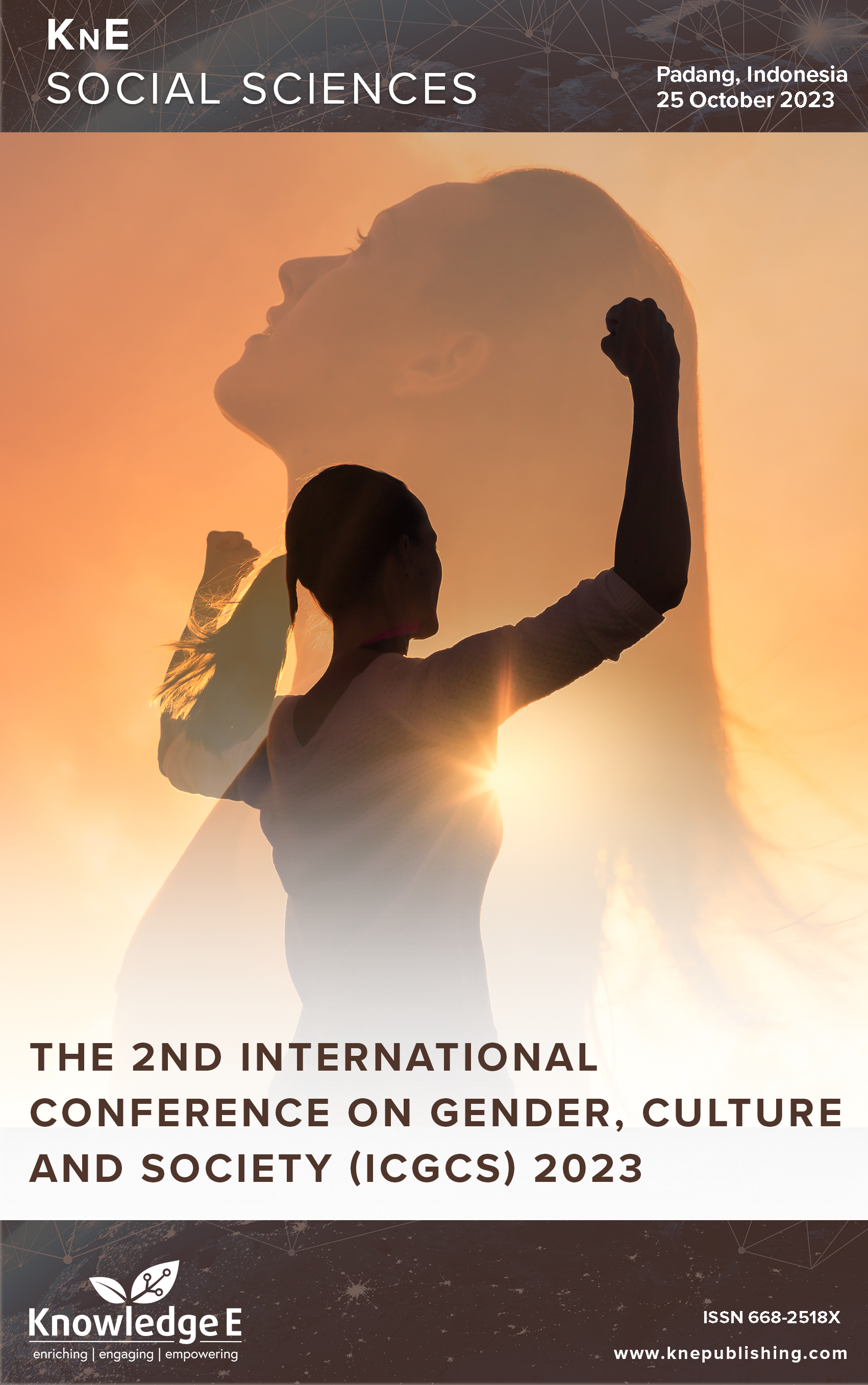Readjustment of Children's Roles and Social Relationships after Parental Divorce
DOI:
https://doi.org/10.18502/kss.v9i23.16737Abstract
This article examined children’s adjustment to their social roles and relationships after their parents’ divorce. This research was based on empirical data collected through interviews and observations of children aged 18 years and under. The collected data was analyzed qualitatively and interpretatively. Research revealed that the dynamics of the relationship between parents after divorce have a direct influence on children’s readjustment. Positive adjustment was seen when parents maintained a good relationship (as friends), and children continued their normal activities such as school and social interactions. On the other hand, if the parental relationship is not friendly, children tend to make negative adjustments, which have a detrimental impact on children, such as boys often fighting, addicted to cigarettes and gambling, but are also found to work while going to school to contribute to the family income and get married at a young age. Girls tend to withdraw and stay at home. These findings emphasized the important role of parental relationships in helping children’s adjustment after divorce. Establishing a healthy co-parenting dynamic is critical to supporting their successful adaptation to the new family structure.
Keywords: readjustment, parent’s divorce, children’s roles; social relationships
References
Ahmadin, Ahmadin. Penyebab Tingginya Angka Perceraian Pada Masyarakat Studi Pengadilan Agama Bima. JIHAD: Jurnal Hukum dan Administarsi. 2022; 4(1). https://doi.org/10.58258/jihad.v4i1.359. DOI: https://doi.org/10.58258/jihad.v4i1.3599
Akpan IJ ,Ezeume IC. The Challenges Faced by Parents and Children from Divorce. Challenge. 2020;63(6). https://doi.org/10.1080/05775132.2020.1842025. DOI: https://doi.org/10.1080/05775132.2020.1842025
Aminah A. Karyanta. Proses Penerimaan Anak (Remaja Akhir) Terhadap Perceraian Orangtua dan Konsekuensi Psikososial yang Menyertainya. Jurnal Fakultas Kedokteran Program Studi Psikologi Universitas Sebelas Maret; 2014.
Amato PR. Children of divorce in the 1990s: an update of the Amato and Keith (1991) meta-analysis. J Fam Psychol. 2001 Sep;15(3):355–70. DOI: https://doi.org/10.1037//0893-3200.15.3.355
Cabilar BO, Adviye EY. Divorce and Post-divorce Adjustment: Definitions, Models, and Assessment of Adjustment. Psikiyatr Guncel Yaklasimlar. 2022;14(1):1–11. DOI: https://doi.org/10.18863/pgy.910766
Canbulat N. Boşanma kadınlarla yürütülen duygu odaklı grupla psikolojik danışman etkililiğinin incelenmesi. Doktora tezi. İzmir: Ege Üniversitesi; 2017.
Coleman M, Ganong L, Russell LT. Resilience in stepfamilies. In: Becvar DS, editor. Handbook of family resilience. Springer; 2013. pp. 85–103. DOI: https://doi.org/10.1007/978-1-4614-3917-2_6
Collins R, Scott C. Sociology of Marriage and The Family: Gender, Love and Property. Chicago: Nelson Hall Inc; 1992.
Dariyo A. Psikologi Perkembangan Dewasa Muda. Jakarta: Grasindo; 2003.
Dietrick P. Gender Differences in Divorce Adjustment. J Divorce & Remarriage. 2015;14(4):33–46. DOI: https://doi.org/10.1300/J087v14n03_03
Desvianur and Yulianti. E. Perbandingan Perilaku Agresif antara Remaja yang Berasal dari Keluarga Bercerai dengan Keluarga Utuh. Jurnal Psikologi; 2018. p. 3.
Fachrina. Fenomena Perceraian dalam Perspektif Sosiologi. Padang: Penerbit Erka; 2018.
Fachrina, Rinaldi EP. Upaya Pencegahan perceraian berbasis Keluarga Luas dan Insitusi Lokal dalam masyarakat Minangkabau di Sumatera Barat. Jurnal Antropologi Indonesia. Indonesian Journal of Social and Cultural Antropology. 2013;34(2):101–11. DOI: https://doi.org/10.7454/ai.v34i2.3966
Goode WJ. Sosiologi Keluarga. Jakarta: PT Bina Aksara; 2007.
Qamar AH, Hafiza FF. Reasons, Impact, and Post-divorce Adjustment: Lived Experi- ence of Divorced Women in Pakistan. J Divorce & Remarriage. 2021;62(5):349–73. DOI: https://doi.org/10.1080/10502556.2021.1871840
Ihromi TO. Bunga Rampai Sosiologi Keluarga (Editor). Bab 6, Pendekatan Perceraian dari Perspektif Sosiologis. Jakarta: Yayasan Obor Indonesia; 1999. p.135-163
Jackson L, Fife ST. The Impact of Parental Divorce: The relationship between Social Support and Confidence Levels in Young Adults. J Divorce & Remarriage. 2018;59(2):123–40. DOI: https://doi.org/10.1080/10502556.2017.1402652
Jensen TM. A Typology of Interactional Patterns Between Youth and Their Stepfathers: Associations with Family Relationship Quality and Youth Well-Being. Fam Process. 2019 Jun;58(2):384–403. DOI: https://doi.org/10.1111/famp.12348
Lamers SM, Bolier L, Westerhof GJ, Smit F, Bohlmeijer ET. The impact of emotional well-being on long-term recovery and survival in physical illness: a meta-analysis. J Behav Med. 2012 Oct;35(5):538–47. DOI: https://doi.org/10.1007/s10865-011-9379-8
Mack KY. Childhood family disruptions and adult well-being: the differential effects of divorce and parental death. Death Stud. 2001;25(5):419–43. DOI: https://doi.org/10.1080/07481180125745
Megawangi R. Membiarkan Berbeda: Sudut Pandang Baru tentang Relasi Gender. Bandung: Penerbit Mizan; 1999.
Michael EM. A study on the psychological well-being and quality of life of Divorced Muslim Women. Kottayam, Kerala: Mahatma Gandhi University; 2015. https://doi.org/10.603/42079.
Moleong LJ. Metodologi Penelitian Kualitatif. Bandung: PT Remaja Rosdakarya Offset; 1994.
Ngurthangpuii, and Geetha VJ. Divorce among men and women in Lawngtlai district, Mizoram: A sociological investigation into the causes. International Journal of Engineering Development and Research. 2021;5(3):1080–6.
Ningrum, P. Rosalia. Perceraian Orang Tua dan Penyesuaian Diri Remaja. eJournal Psikologi. 2013;1(1):69-79. DOI: https://doi.org/10.30872/psikoborneo.v1i1.3278
Nisfiannoor M, and Yulianti E. Perbandingan Perilaku Agresif Antara Remaja yang Berasal dari Keluarga Bercerai dengan Keluarga Utuh. Jurnal Psikologi. 2005;3(1).
Ramdania D. Aspek Hukum Perceraian dalam Perspektif Hukum Islam: Studi Ter- hadap Tingginya Tingkat Cerai Gugat Di Pengadilan Agama Kota. Bandung. Wacana Paramarta. Jurnal Ilmu Hukum. 2020;19(1): https://doi.org/10.32816/paramarta.v19i1.81. DOI: https://doi.org/10.32816/paramarta.v19i1.81
Russell LT, Beckmeyer JJ, Coleman M, Ganong LH. Perceived Barriers to Postdivorce Co-Parenting: Differences between Men and Women and Associations withCco- Parenting Behaviors. 2016;65:450-461. https://doi.org/10.1111/fare.12198. DOI: https://doi.org/10.1111/fare.12198
Runyon RP, Haber A. Psychology of Adjustment. Illinois: The Dorsey Press; 1984.
Said HA. Fuad. Perceraian menurut Hukum Islam. Jakarta: Pustaka Al-Husna; 1994.
Sinolungan AE. Perkembangan Peserta Didik: Psikologi Perkembangan. Jakarta: Gunung Agung; 1997.
Scott J, et al. Children, Families and Divorce. (The Blackwell Companion to The Sociology of Families). United Kingdom: Blackwell Publishing Ltd.; 2004. https://doi.org/10.1002/9780470999004. DOI: https://doi.org/10.1002/9780470999004
Skyer W. Roper, Stephen T. Fife and Ryan B. Seedall. The Intergenerational Effects of Parental Divorce on Young Adult Relationships. J Divorce & Remarriage. 2019. https://doi.org/10.1080/10502556.2019.1699372. DOI: https://doi.org/10.1080/10502556.2019.1699372
Willis SS. Remaja dan Masalahnya. Bandung: Alfabeta; 2018.
Wijaya LN. Pola Pengasuhan Remaja dalam keluarga Broke Home Akibat Perceraian. 2018. http//sosiologi.fisip.uns.aci.id/online-jurnal

